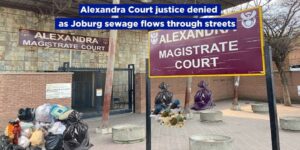South Africa’s municipalities are in deep trouble, and the latest data from National Treasury confirms it.
A shocking 116 municipalities last year submitted unfunded budgets for the 2024/2025 adjustment cycle. This means they’ve planned to spend money they don’t actually have, which is not just irresponsible, it’s illegal.
According to Section 18 of the Municipal Finance Management Act (MFMA), all municipal budgets must be backed by real, expected revenue. Submitting an unfunded budget is against the law and could trigger a constitutional intervention under section 139(5). Yet time and again, ANC-run councils continue to ignore this, and it’s ordinary South Africans who suffer the consequences.
People who pay their municipal bills are getting nothing in return: sewage running through streets and yards, constant water cuts, and long power outages caused by poor planning and a lack of skilled staff.
But the crisis doesn’t stop there. Treasury’s March 2025 report shows that provincial governments owe municipalities a staggering R12.4 billion. This affects 186 municipalities – many of which are already under some form of intervention. Yet, not a single official has been held accountable. This isn’t about a lack of money, it’s a complete breakdown in responsibility.
More worrying figures from the Auditor-General and CoGTA include:
- Over R5 billion wasted on fruitless and wasteful expenditure in the last year;
- Nearly R80 billion in unpaid municipal debt – including R26 billion owed to Eskom; and
- R3.8 billion in unspent infrastructure grants, which means communities were denied roads, water, and sanitation upgrades.
The problems behind this crisis aren’t hard to identify:
- Illegal connections and broken billing systems are choking off revenue;
- Up to 40% of clean water is lost to leaks before reaching residents; and
- Failed officials face no consequences, and political interference is rife.
We don’t need new funding models, as suggested by the Minister of Cooperative Governance. What we need are competent leaders, basic accountability, and for national and provincial governments to pay what they owe to municipalities.
After 30 May 2025, when final municipal budgets are submitted, the DA will be watching closely. We’ll track:
- Which municipalities are still tabling unfunded budgets – and why;
- Which national and provincial departments continue to default on their municipal bills; and
- What action is being taken to fix infrastructure and restore service delivery.
The warning signs are everywhere. The numbers don’t lie. And the time for excuses is over.




